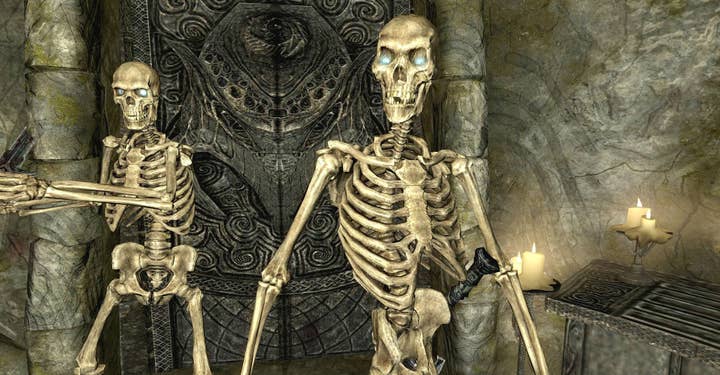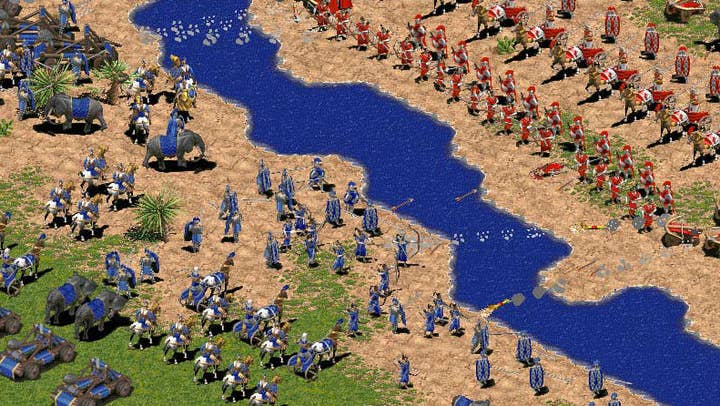Culturalisation, and why Microsoft rewrote history for Korea
Geogrify's Kate Edwards discusses how to tailor your game for global appeal - and what to do if you inadvertently cause offence
In China, the colour red is used to indicate something positive. In a significant amount of video games, it's used to indicate damage taken or other negative aspects.
In some Asian countries, the colour white is used for mourning instead of black, and it's inappropriate to have skeletons on display (or even as in-game enemies) because this goes against traditions of respecting the dead.
These are just a few examples of how the context of a video game can change completely based on the culture playing it. With so many different beliefs, traditions and perspectives, it can be difficult to build a game that will enjoyed around the world without knowing more about the people you're targeting.

The need for localisation in video games is well established but, as these examples show, simply adapting text to the local language isn't enough to win over foreign markets. Instead, former IGDA executive director Kate Edwards urges developers to put more effort into culturalisation.
She explains: "Culturalisation is aimed at all the other content that can potentially influence an audience or that an audience might react to. It can refer to symbols, gestures, colour usage, character design - it can even refer to the story itself, if the story has historical allegory inside of it. There's all kinds of other issues that an audience can react to.
"The language part is essential for basic legibility, but what I often encourage is culturalisation, because that's how you make content more meaningful. You can dig deeper into a culture and use things from a certain culture to actually make the content more appealing, or to evoke a certain sense of culture that language alone can't handle.
"I want [games] to be enjoyed by as many people as possible around the world. In order to achieve this, language alone is not going to do it. You can translate to all those different versions but if the content itself is going to have something that's potentially problematic, it's not compatible with the local expectations of their cultural values."
The purpose of culturisation is manifold. Core to the process is "helping the content maximise its reach" and thus the potential audience for the developer, but it's also about ensuring nothing in the game either breaks the player's immersion or, worse, causes offense. Edwards warns that something doesn't resonate with the player's culture, it can "throw them out of the experience", and particularly egregious examples can go far beyond this.
"Language is essential for basic legibility, but culturalisation is how you make content more meaningful"
"In some cases they could escalate that to the government, and the government gets all riled up and issues a ban on this game that's doing something 'offensive'," she warns.
That being said, Edwards is quick to stress that culturalisation is not the same as censorship, having been regularly told she is "part of the PC [politically correct] police."
To this, she says: "I fervently believe in the desire and the desire for developers to make anything they want. I really believe that games are an art form, they are a form of self expression and free speech. I don't care what a developer makes. They can make the most racist, vile thing or whatever. I'm not going to play it, and probably 99 per cent of the public won't play it, and they'll probably make a really stupid reputation for themselves, too, but they should have the freedom to do it. But if they have any desire to make money off their creative vision, then they are subject to market forces."

In Edwards' eyes, there are two sides to this discipline: reactive culturalisation, which involves looking only for things that are likely to provoke an immediate reaction, and pro-active culturalisation.
"This is where you actually go out of your way during the game design phase to think about whether there are things, content elements or anything you can put in the game that's actually going to enhance the feeling of the game for a certain market," Edwards explains.
"Some people think the US isn't a sensitive market, but it's very sensitive to things like sex, nudity, racism. Developers can't just assume that anything goes"
"If we want to target China specifically or the Middle East, are there things we can add to the game that are actually more appealing to those players? Players in other markets, like North America or Europe might not care either way, but you can do things to make that experience just that much better for those target markets."
For example, developers could include adding Middle Eastern characters - "not stereotypes, of course" - to games planned for release in those regions. Even if the game is set in a fantasy world, its appeal can be broadened with the addition of characters that aren't from the usual caucasian cultures.
It's important to note this is not just about targeting gamers outside the typical Western markets. Even cultures closer to home need to carefully considered when designing games - case in point, the recent ban of Omega Labyrinth Z: a title that's culturally acceptable at home in Japan, but offensive to many in Europe.
"Some people think that the US isn't a sensitive market, but of course it is," Edwards adds. "It's very sensitive to things like sex, nudity, racism. Developers can't just assume that anything goes in the US because it doesn't. The only difference is that in the US, like a lot of the more open markets, we don't control content from a government level. We rely on retailers to regulate content. The reason why we don't have all the games in the US is that Walmart and Target won't sell them. That's pretty much it. It's a retail model that restricts the content. It's not the government that does that."
It's also vital to think about culturalisation as early as possible - another key difference between this discipline and the more common localisation.
"Most localisation tends to happen towards the end of the product cycle because you are waiting for the content to be done," says Edwards. "You are waiting for it be 'done'. Done enough so that you can actually do the translation and the content isn't going to change. With culturalisation, the great bulk of my work, probably about 75 per cent, is done in the early stage. I am sitting down with producers, the writers, the artists, and looking at the early concept art and really the early script and wanting to understand the world they're making, who is in it, what happens here. I see myself as a world-building partner. I am trying to help with their assumptions around the world building."
Edwards has been working for more than a decade at culturalisation specialist Geogrify, but it's something that she has been considering throughout her entire career. One famous example she offers is the original 1997 Age of Empires, which taught her that adapting a game can compel you to question your own moral compass. Developers may well find themselves reconsidering "where they draw the line in the sand."
The Age of Empires scenario in question involved Japanese forces from the Yamato dynasty invading the Korean peninsula and taking over the Joseon Empire during the Middle Ages.
"A lot of the time [changing] the content to appease the one market that was yelling about it [means] now you've pissed off their neighbour"
"The Korean Ministry of Information said that never happened - even though that's what historians document that's what happened," Edwards explains. "So what are you meant to do?
"We stepped back, asked ourselves what we were going to do. Microsoft had a long-term strategy for getting into the games business, and we wanted to dominate that vertical. Market research showed us that RTS games in Korea were very popular - this was in 1997, and we all know what happened a year later with StarCraft.
"Then it came down to the question of: 'Do we actually change history? Are we going to change history for the sake of this one government?'. Of course, as you would imagine, on the team that led to ethical discussions, like what is the Truth? Who decides Truth? All the debates about history being written by the victors and blah blah blah. These are all good discussions to have. But ultimately, we still have to make a decision that is supporting the business of the company."

In the end, the team decided to make a Korea-only patch that changed that specific scenario. In the Korean version, the Joseon Empire invaded Japan - which historically did not happen, but appeased the Ministry of Information.
"We ultimately think we did that was right for the business," Edwards says. "People can debate - did Microsoft cross the line? What line is it that they crossed? If the line is such that they are basically culturally adapting the content to serve the local expectation, then they do what they are supposed to do. If they weren't serving truth in terms of historical truth, then no they weren't serving that. Is that what Age of Empires was meant for? I would argue no, because in other versions of Age of Empires, the Aztecs had tanks. They never had tanks. So how accurate is Age of Empires really supposed to be? It's not. It's basically using history as a backdrop for really fun games, for entertainment.
"To me, that's culturalisation. You have to weigh all of these factors and basically do what you think is right for the game, the developers and their vision of the game, you have to do what's right for the company."
Edwards adds that the decision was also made to ensure the possibility of releasing future games in Korea, regardless of genre or historical accuracy. Had Microsoft rejected Korea's concerns, it would have effectively closed off that market to them.
" 99 per cent of the time if you cause some offence like that, especially inadvertently, they thought you did it for a reason; they believe it was intentional"
"A lot of developers don't understand that a lot of governments have long term memories about this kind of thing," Edwards warns. "They don't forget easily. I'm not saying we have to bend over backwards and do their will, but you have to be fully conscious of the long-term implications of what even one decision on one game can do in a particular market. Some are forgiving about it; some are not forgiving at all, like China."
So what should developers do if their game is released in a foreign market and complaints begin flooding in? The first thing Edwards urges is to not panic, as this can lead to knee-jerk reactions and rushed alterations.
"A lot of the time [changing] the content to appease the one market that was yelling about it [means] now you've pissed off their neighbour, or other people in the region," Edwards warns. "You do that, and suddenly you have made the problem far worse for yourself. You have to be super careful about the knee-jerk."
Instead, developers need to think about what the goals for their game, their company, and whether they plan to do any further business in that market. If there is content in their game that's intrinsic to the design, narrative or some other aspect, they must be sure they're ready to defend it.
"You have to be ready with an answer that's not just, 'we did it because we thought it was cool'," says Edwards. "I've seen this happen many times. I encourage developers to write up a one or two-page explanation about why you made that one particular choice, the one that you know could be potentially sensitive. If you get asked, you can actually show that to them, to the government or whoever it might be, and say, 'we thought this through - we consulted with these academics, we talked to this person, we did our own market research and determined that it's not going to be a big deal. That's why we did it - we did our homework.'
"Sometimes that actually helps and it can make the aggressors back off a little bit. Some might hate what you did, but it shows you didn't do it out of ignorance. That's often the biggest problem - there's an assumption that you did it. It's not that you did it out of ignorance, but 99 per cent of the time if you cause some offence like that, especially inadvertently, they thought you did it for a reason; they believe it was intentional. And it almost never, ever is. It's just ignorance.
"The flipside of this as I have heard a lot of people push back to me, and say 'Isn't this publicity good or my game? Isn't it okay if I did something offensive and everyone is reporting on it? Isn't that a good thing?'. There's the whole notion that there's no such thing as bad publicity; there is some truth to that, but do you want to be known as that company? 'We're the company that pisses people off'."
